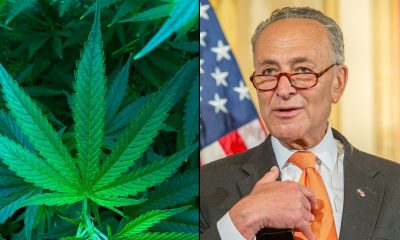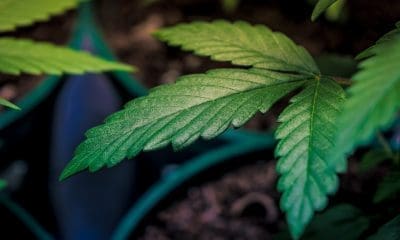Politics
With State Law Against Drug Possession Overturned, Washington Governor Frees 15 People From Prison

Fifteen people incarcerated on drug possession charges in Washington State will be released from prison following commutations issued this week by Gov. Jay Inslee (D), nearly two months after the state Supreme Court struck down the state’s felony law against simple possession of controlled substances.
The governor’s office announced the commutations on Tuesday, saying that 13 of the petitions had already been signed, and two more were expected to be finalized later in the day—with even more to come soon.
Lawmakers, meanwhile, are working to pass legislation to respond to the court ruling, State v. Blake, before the legislative session ends later this month.
Inslee’s signing of the commutation petitions, submitted by people currently in prison solely on simple drug possession charges, essentially cuts through the ongoing process of clearing past possession convictions and resentencing people accordingly. It means that the 15 people, already eligible for release following the Supreme Court decision, will be released sooner than they would have through judicial procedures. None of the convictions have been legally valid since the court case was decided in late February.
“While prosecutors and the courts have worked to vacate the convictions of individuals convicted and sentenced under this now-invalidated drug possession statute,” Inslee’s office said in a news release, “the governor has endeavored to use his clemency authority to expeditiously facilitate a more immediate release for other individuals in custody solely on these convictions.”
Fewer than 100 people in the state were estimated to be incarcerated on possession charges alone shortly after the Supreme Court issued its decision. That number has already dropped to about two dozen people, Taylor Wonhoff, deputy general counsel for Inslee, told the Seattle Times. The bulk of the releases were handled earlier by county prosecutors and courts.
Wonhoff said the governor’s office recently created a very simple commutation petition form, then circulated it to people through the state Department of Corrections to people imprisoned for drug possession. “What we did was created a very basic petition,” he said, “which basically says, ‘Here’s my name, here’s my signature, I want a Blake commutation.’”
As of Tuesday evening, the Times reported, 12 of the 13 people whose petitions had already been signed had already been released from state custody. Even people whose sentences are commuted, however, will still need judges to clear the now-invalid convictions from their criminal records.
The Supreme Court decision came unexpectedly for lawmakers, who are now working to decide how to address the fallout of the ruling. While the court said only a narrow part of the law was unconstitutional—the fact that it failed to require that defendants knowingly possess a drug—it voided the possession law completely.
“Although we knew it had been winding its way through the courts,” Rep. Roger Goodman (D) said last month, “with everything else, we forgot about it. Then this earth-shaking opinion comes out right in the middle of the legislative session.”
In addition to weighing how to fund court costs of identifying and resentencing individuals whose convictions are no longer lawful, the legislature is also considering whether—and how—to replace the state’s felony drug possession law. Democrats and Republicans have introduced bills that would reinstate the felony charge for simple possession, but a progressive bloc in the House of Representatives that has grown more powerful in recent years insists that the chamber won’t pass legislation that re-establishes criminal penalties for small amounts of drugs.
Of several bills introduced in the wake of the ruling, one leading proposal, SB 5476, would leave simple drug possession decriminalized. As introduced, the measure would establish “personal use” amounts of controlled substances, and adults found with anything less than those amounts see no criminal or civil penalties, although they could be referred to evaluation and treatment for substance use disorder. Opening or using controlled substances in public would be subject to a $125 civil fine, which would help defray administrative costs resulting from the state’s abrupt decriminalization.
The Senate Ways and Means Committee took initial public testimony on the bill earlier this month, and at a hearing this past Saturday voted to advance the bill without recommendation to the Senate Rules Committee. Little if any debate is expected in that committee before the bill advances to the full Senate floor for what’s likely to be a contentious debate.
Several amendments have already been introduced and are expected to be taken up on the Senate floor. Most are contained in a proposed substitute bill by Sen. Manka Dhingra (D), the sponsor of the original bill, and are relatively minor clarifications. Among the more major changes, the substitute authorizes the presiding judge in any county to appoint commissioners that would assist the court with resentencing and vacating convictions affected by the Blake decision. It also clarifies that anyone under 21 found in possession of controlled substances would be under the jurisdiction of juvenile courts and require the courts to offer diversion to treatment for a person’s first offense. The substitute also eliminates a provision requiring a $125 fine for public drug use to fund court administrative costs.
Two competing amendments would gut the original decriminalization proposal and reinstate felony drug possession charges for drug possession committed knowingly. One was put forward by Sen. Lynda Wilson (R) and would also establish a state legislative workgroup to study further drug reform measures.
“I do think that that’s the direction we need to go,” Wilson said at the Ways and Means Committee hearing. “I think putting knowingly back into the statute is what will be at least a good fix right now, and then we study it later. I’m afraid that if we do too much now that we won’t get it quite right—or right at all.”
The other major amendment, from Sen. Keith Wagoner (R), would temporarily reinstate felony possession charges but also step up SB 5476’s proposed penalties for public drug use to a Class 1 civil infraction, which carries a $250 fine. It would also create some optional programs to divert drug cases to evaluation and treatment, “so you can be diverted once or maybe twice with a prosecutor’s authority,” Wagoner said at the hearing.
“Yeah, I’m not going to pretend to have written the entire amendment,” he told the panel, “but I think the point that we’re trying to do, you’re trying to recognize…first of all, we’ve got a big problem and we’ve got to do something about it now. But this doesn’t have to be a permanent solution.”
Dhingra told the panel that the policy embodied in the competing amendments “actually goes back to about five years ago to where we were as Washington State.”
The Ways & Means Committee discussed the mechanics of the proposed amendments on Saturday but did not act on them, leaving them to be discussed later on the Senate floor. “Rather than going through all of the amendments and motions, we’re going to move that we move that to the rules committee without rec,” said committee chair Sen. Christine Rolfes (D), “and continue in-depth policy discussion in preparation for floor action.”
The panel voted 15–7–3 to advance the bill without amendments, with Wilson and Wagoner voting to kill the measure rather than fight for their amendments on the Senate floor.
On the House side, Goodman, a longtime drug reform advocate who supports ending criminal penalties for simple possession, told Marijuana Moment earlier this month that with the legislative session set to end on April 25, “time is our enemy in this enterprise.”
“The Blake decision is both a blessing and a curse,” he said, “because it’s an opportunity for us to come up with a more effective approach that does less harm, but we don’t have the opportunity to be deliberate and inclusive in conversations with interested parties, so it’s not as well thought-out a proposal as it would be otherwise. It has to be an interim measure.”
“The story to tell of this issue isn’t about drugs,” he added. “This is about helping your loved ones—your neighbors, your friends, your children—who are in trouble. The two big messages are: What we’re doing isn’t working, and we want to help people.”
In February, Goodman’s panel approved a separate bill to decriminalize drug possession and expand treatment services, but it failed to advance further by a key legislative deadline.
Just five years ago, few state legislatures would have dreamed of letting drugs remain decriminalized after a court decision like Blake. Now lawmakers in Washington have the opportunity to be the first to decriminalize drugs through the legislature—and there’s a chance they’ll take it.
“A lot has changed in the past five years. Since our most recent president, there’s an appetite for more radical transformation of our society and to react to retrograde policies of the past century,” Goodman said. “Also those who are active in the political sphere are younger, even over the course of these last several years.”
Oregon voters historically ended prohibition of low-level drug possession at the ballot during last November’s election, which has contributed to the national conversation.
In both Maine and Vermont, lawmakers have also recently unveiled legislation last month to decriminalize small amounts of illegal drugs. Last month, a Rhode Island Senate committee held a hearing on legislation that would end criminal penalties for possessing small amounts of drugs and replace them with a $100 fine.
In New Jersey, meanwhile, Gov. Phil Murphy (D) said last month that he’s “open-minded” on decriminalizing all drugs.
“There’s this phenomenon called discontinuous change,” Goodman told Marijuana Moment, “where nothing happens and nothing happens and nothing happens, and then the Berlin Wall falls down. We’re getting to that place in drug policy where it’s a tipping point.”
Biden’s Pick To Lead DEA Voiced Openness To State Medical Marijuana Program
















